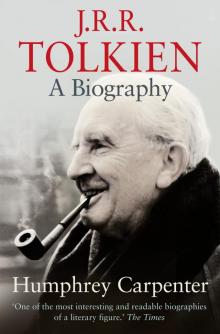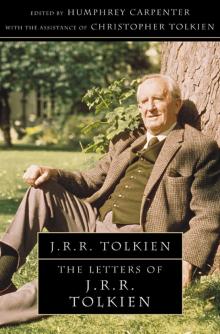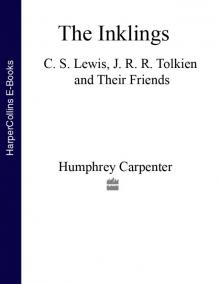- Home
- Humphrey Carpenter
The Inklings Page 7
The Inklings Read online
Page 7
*
One reason for Lewis’s holding back from conversion for so long was his inability to find the Gospel story attractive. It evoked none of the imaginative response that was aroused in him by pagan myths. As he told Greeves, ‘the spontaneous appeal of the Christian story is so much less to me than that of Paganism’. This was perhaps one reason why he now began to create his own fictional setting for Christianity.
He had already made two attempts to write an account of his conversion. The first, in prose, had been begun while he was a Theist but not yet a Christian, and it was soon abandoned. In the spring of 1932, shortly after returning to the practice of Christianity, he tried again, this time in verse. But again he quickly abandoned the project. Then, in August of the same year, he suddenly found the right method.
He had been at work for some time on a projected book about the allegorical love-poetry of the Middle Ages, and in consequence he had made a thorough study of the workings of allegory. Though Bunyan’s Pilgrim’s Progress was outside the scope of his project, he had known and loved it since childhood, and now its example rose before him. While staying with Arthur Greeves in Belfast he began to write what he called The Pilgrim’s Regress: An Allegorical Apology for Christianity, Reason, and Romanticism. As he himself said of Bunyan’s book, ‘Now, as never before, the whole man was engaged’. In a fortnight this witty and often moving allegory of a modern pilgrim’s journey to Christianity was finished.
The writing of stories in prose came almost incredibly easy to Lewis. ‘It’s such fun after sweating over verse,’ he said, ‘like free-wheeling.’ He worked fast, managed to write almost everything in one draft, and never made more than minimal revisions. This was in marked contrast to Tolkien who, though he wrote fast, took endless pains over revision and regarded it as a continuing process that was not necessarily complete when the book was published. The two men were also very different in their attitudes to the manuscripts of their work. Tolkien invariably kept all his drafts and his notes; Lewis just as invariably tore his up as soon as the book reached print. He also tore up other people’s. Tolkien recalled: ‘He was indeed accustomed at intervals to throw away papers and books – and at such times he destroyed those that belonged to other people. He “lost” not only official documents sent to him by me, but sole MSS. of at least two stories.’
The most important fact about The Pilgrim’s Regress is one that can easily be missed because it is so obvious. Less than a year after he had become a Christian, Lewis already felt capable of telling other people about his own experiences, capable of being an ‘apologist’, a defender of Christianity by argument. There was to be no novitiate, no period in which he would wait for his understanding of his religion to mature and deepen. He must begin right away.
Nor was the book just to be a defence of Christianity. In it he also championed the two things which he believed had helped him along the road to belief: Reason, and ‘Romanticism’, by which he specifically meant the search for ‘Joy’. And in defending these two things he launched, in The Pilgrim’s Regress, a forceful and often bitter attack against almost every other form of thinking current in his time. For in describing the snares which the pilgrim encounters on his journey, Lewis enumerates not only traditional intellectual or emotional dangers (Ignorantia, Superbia, Orgiastica, Occultica, and so on) but also brings more contemporary enemies into the tale. At least, to him they were enemies.
Lewis had conceived a profound dislike not merely for T. S. Eliot’s poetry but for the whole modernist movement in the arts. In The Pilgrim’s Regress his hero lands in the middle of ‘the Clevers’, allegorical figures representing what Lewis thought were the objectionable features of the nineteen-twenties art forms. In a later edition of the book he added running headlines identifying the various members of the Clevers as ‘The poetry of the Silly Twenties’, ‘The swamp-literature of the Dirty Twenties’, and ‘The gibberish-literature of the Lunatic Twenties’. And it is not only the arts that come under attack in the book. Freudianism and Marxism are among the many other dangers that the pilgrim encounters, and Lewis’s feelings towards the whole era are summed up at the moment in the story when Reason attacks and slays the Zeitgeist or Spirit of the Age.
After the pilgrim has escaped from ‘darkest Zeitgeistheim’ he spends the night at the house of ‘Mr Sensible’, a learned but utterly shallow dilettante who undoubtedly represents Lewis’s view of many of his Oxford colleagues – well-read men, able to produce witty aphorisms for every occasion, but adhering to no religion or philosophy and living a shallow life; the kind of man in fact that Lewis was thinking of when he said that, in contrast, Hugo Dyson was ‘none of your damned dilettanti’. Then, from the house of Mr Sensible, the pilgrim John journeys into sterner regions of the mind; and here the book launches an attack on another of Lewis’s enemies.
Sheltering in a hut and attempting to survive by extreme asceticism are three Pale Men, ‘Humanist’, ‘Neo-Classical’, and ‘Neo-Angular’. The first two profess no religion, but Neo-Angular is a believer in ‘the Landlord’, the figure that stands for God in the allegory. His practice of religion, however, is a very different thing from the orthodoxy which John eventually embraces. ‘My ethics are based on dogma, not on feeling,’ he tells John, and he disapproves of John’s search for ‘the Island’, the allegorical representation of ‘Joy’, telling him that it is the wrong reason for the pilgrimage. He also declares that John should not speak directly to ‘Mother Kirk’ (the Church) but should ‘learn from your superiors the dogmata in which her deliverances have been codified for general use’. Lewis explained this part of the allegory in a letter to a friend: ‘What I am attacking in Neo-Angular is a set of people who seem to me to be trying to make of Christianity itself one more highbrow, Chelsea, bourgeois-baiting fad. T. S. Eliot is the single man who sums up the thing I am fighting against.’
Eliot’s conversion to Christianity had by this time become a matter of public knowledge, but it had not endeared him to Lewis, who felt that Eliot’s form of religion was ‘High and Dry’, not merely sectarian in its Anglo-Catholicism but also emotionally barren and counter-romantic. So in The Pilgrim’s Regress a character dismisses the fact that Neo-Angular is a Christian by suggesting that he may be only ‘poacher turned gamekeeper’.
The book’s title is explained in the last section. John the pilgrim, after crossing by Mother Kirk’s aid the chasm of original sin, has no sooner become regenerate as a Christian than he is told to retrace his steps. This he does, passing once more through the regions of the mind and seeing them for the delusions they really were. He comes at last to his childhood home of Puritania, and it is from the gate of his parents’ cottage that he finally climbs the foothills towards the mountain where stands the Landlord’s Castle, the City of God. He has come at last to true ‘Joy’, and has found it in – of all places – the religion of his childhood.
This element of revisiting childhood, combined with the attack on contemporary ideas, did not escape the notice of the critics. ‘Though Mr Lewis’s parable claims to reassert romanticism,’ remarked The Times Literary Supplement reviewer when the story was published in 1933, ‘it is the romanticism of homesickness for the past, not of adventure towards the future, a “Regress” as he candidly avows.’
Among Lewis’s friends there was one who gradually began to think that the book’s title was particularly significant, though in rather a different way. Tolkien admired The Pilgrim’s Regress, but many years later he wrote of it: ‘It was not for some time that I realized that there was more in the title Pilgrim’s Regress than I had understood (or the author either, maybe). Lewis would regress. He would not re-enter Christianity by a new door, but by the old one: at least in the sense that in taking it up again he would also take up, or reawaken, the prejudices so sedulously planted in boyhood. He would become again a Northern Ireland protestant.’
*
Was Lewis an Ulster Protestant? In Surprised by Joy he denies that he had been bro
ught up in any particularly puritanical form of religion, and he was very angry when a Catholic publisher who reissued The Pilgrim’s Regress identified ‘Puritania’ with Ulster. ‘My father’, declared Lewis, ‘was, by nineteenth-century and Church of Ireland standards, rather “high”.’ However, his diary of life at Wynyard School, written when he was ten years old, gives a rather different impression:
We were obliged to go to St John’s (Watford), a church which wanted to be Roman Catholic, but was afraid to say so. A kind of church abhorred by respectful [sic] Irish Protestants. In this abominable place of Romish hypocrites and English liars, the people cross themselves, bow to the Lord’s Table (which they have the vanity to call an altar), and pray to the Virgin.
Twenty-two years later when Lewis resumed the practice of religion he was still rather evangelical in his approach, making his Communion only at major festivals and generally preferring to attend Matins. After a time he increased his frequency of Communion to monthly intervals. Eventually he adopted the habit of communicating weekly and on major saints’ days. Indeed as the years passed he became distinctly more ‘Catholic’ in his practices. He began to make regular confessions, and came to believe in the importance of prayers for departed souls. Yet these things did not play a large part in his religious thought, or at least not in his Christian writings, where he rarely discussed them. Indeed, he tried to avoid anything that would classify him as ‘Anglo-Catholic’ or ‘Evangelical’. He hated such terms and maintained that to say that you were High Church or Low Church was to be wickedly schismatical.
For him, the real distinction lay elsewhere, not between High and Low at all but between religious belief that was orthodox and supernatural on the one hand, and ‘liberal’ and ‘demythologised’ on the other. He had been on a long journey before he arrived at Christianity, and now that he had arrived he was determined to accept the traditional doctrines of the Church; he wanted not to argue about them or to reinterpret them but to defend them. As a result he was highly critical of the ‘broad church’ as he called it, the liberalism which he believed to be the canker in modern Christianity. Among the targets for attack in The Pilgrim’s Regress is ‘Mr Broad’, who though a ‘Steward’ (a clergyman) doubts the necessity of actual conversion. ‘I wouldn’t for the world hold you back,’ he tells John. ‘At the same time there is a very real danger at your age of trying to make these things too definite. These great truths need reinterpretation in every age.’ Lewis thought he saw this attitude growing in the contemporary church, and he took a stand firmly in opposition. For him, the great truths did not need reinterpretation. They needed to be championed, to be defended as much against ‘liberalisers’ as against unbelievers. In this attitude he was in agreement with two ultra-orthodox defenders of the faith, G. K. Chesterton, whose apologetic writings had been an influence on him during his conversion, and Tolkien.
Tolkien was a devout Roman Catholic. He had hoped that Lewis too might become a Catholic, and he was disappointed that he had returned to membership of the Church of England (the equivalent of the Church of Ireland in which Lewis had been baptised). Tolkien was strongly unsympathetic towards the Church of England, not least because during his childhood his own mother, a Catholic convert, had been treated harshly by relatives who belonged to it – indeed he believed that this ‘persecution’ had hastened her death. As a result he was particularly sensitive to any shade of anti-Catholic prejudice.
Unfortunately Lewis retained more than a trace of the Belfast Protestant attitude to Catholics. In unguarded moments he and his brother Warnie might refer to Irish Catholics as ‘bog-trotters’ or ‘bograts’, and, though they usually avoided such crude remarks in Tolkien’s presence, there were moments of tension. ‘We were coming down the steps from Magdalen hall,’ Tolkien recalled, ‘long ago in the days of our unclouded association, before there was anything, as it seemed, that must be withheld or passed over in silence. I said that I had a special devotion to St John. Lewis stiffened, his head went back, and he said in the brusque harsh tones which I was later to hear him use again when dismissing something he disapproved of: “I can’t imagine any two persons more dissimilar.” We stumped along the cloisters, and I followed feeling like a shabby little Catholic caught by the eye of an “Evangelical clergyman of good family”1 taking holy water at the door of a church. A door had slammed. Never now should I be able to say in his presence:
Bot Crystes mersy and Mary and Jon,
Thise am the grounde of alle my blysse
– The Pearl, 383-4; a poem that Lewis disliked2 – and suppose that I was sharing anything of my vision of a great rood-screen through which one could see the Holy of Holies.’
Tolkien wrote this thirty years later, when other events had soured his recollections. In the early days of the friendship such moments were rare, and for the most part he was profoundly grateful for Lewis’s conversion. In October 1933 he wrote in his diary that friendship with Lewis, ‘besides giving constant pleasure and comfort, has done me much good from the contact with a man at once honest, brave, intellectual – a scholar, a poet, and a philosopher – and a lover, at least after a long pilgrimage, of Our Lord’.
*
‘On Saturday last, I started to say my prayers again after having discontinued doing so for more years than I care to remember: this was no sudden impulse, but the result of a conviction of the truth of Christianity which has been growing on me for a considerable time.’
This was written not by Jack Lewis but by his brother Warnie. During the months when Jack was returning to Christianity, Warnie too was resuming the religious beliefs and practices of his childhood. Like Jack he had in boyhood drifted away from the Church. Now in 1931 his return to Christianity was different in manner from his brother’s. He indulged in few philosophical speculations, merely recording in his diary that his new-found belief was ‘a conviction for which I admit I should be hard put to find a logical proof, but which rests on the inherent improbability of the whole of existence being fortuitous, and the inability of the materialists to provide any convincing explanation of the origin of life’.
While he was at home at the Kilns early in 1931, Warnie went to Matins at the local church with Jack. But the brothers scarcely discussed their changing views, and soon afterwards Warnie was posted to Shanghai for his final months of army service. It was there, and without any knowledge that his brother was doing the same, that he made his Communion for the first time for many years on Christmas Day 1931. A few weeks later a letter from Jack reported that he too had made his Communion on that day. ‘I am delighted,’ Warnie wrote in his diary. ‘Had he not done so I, with my altered views, would have found – hardly a barrier between us, but a lack of complete identity of interest which I should have regretted.’ Jack, when he learnt of Warnie’s full return to Christianity, made the same comment: ‘What a mercy that the change in his views (I mean as regards religion) should have happened in time to meet mine – it would be awkward if one of us were still in the old state of mind.’
The brothers’ new ‘identity of interest’ was reflected when, after Warnie’s retirement from the army and his return to the Kilns as a permanent member of the household, the two of them almost immediately set off on a walking tour, their first together, up the Wye Valley. Warnie, despite his army training, was nervous about carrying a heavy pack for twenty miles or more a day, but he was soon being pleasantly surprised at the ease of it all, and at the end of their journey he judged it to be one of the best holidays he had ever had. This was in January 1933, and for many years afterwards a January walking tour was a regular fixture for the two brothers, quite independent of Jack’s annual walk with Barfield and the other friends of that set, which usually took place just after Easter. Warnie and Jack were at their happiest on these walks, talking about anything from beer to theology. ‘We discussed’, Warnie noted in January 1935 when he and Jack were walking in the Chilterns, ‘how useful it would be if there were a beer map of England, showing the areas
controlled by each Beer Baron.’ Another day they argued about the nature of personal immortality. Warnie was less well-read than Jack, but with his speculative imagination and his common sense he was an excellent companion for his brother.
At home too they spent a lot of time together. In term, Jack now slept in his college rooms, partly so that he could go to chapel early in the morning and begin work immediately after breakfast. (Mrs Moore declared herself to be an atheist and was inclined to mock at the brothers’ return to Christianity.) But in the afternoons Jack came out to the Kilns, where he and Warnie took the family dogs for a walk, or worked in the garden, rebuilding paths and planting saplings, which they called ‘public works’. Warnie had a bedroom at the Kilns, but he kept most of his books in Magdalen, in one of his brother’s two sitting-rooms; and he usually spent the morning there, sorting out and typing transcripts of the Lewis family papers, a task that took him several years. In fact it became his chief occupation, for his army pension together with small private means meant that he did not need to take a paid job. He was able to spend much of his time going to concerts, and reading, which he did a great deal. He also got to know Jack’s friends when they dropped in at Magdalen.
He was typing one morning in February 1933 when (he wrote in his diary) ‘in came J’s friend Dyson from Reading – a man who gives the impression of being made of quick silver: he pours himself into a room on a cataract of words and gestures, and you are caught up in the stream – but after the first plunge, it is exhilarating. I was swept along by him to the Mitre Tap in the Turl (a distinct discovery this, by the way) where we had two glasses of Bristol Milk apiece and discussed China, Japan, staff officers, Dickens, house property as an investment, and, most utterly unexpected, “Your favourite reading’s Orlando Furioso isn’t it?” (deprecatory gesture as I got ready to deny this). “Sorry! Sorry! my mistake.” As we left the pub, a boy came into the yard and fell on the cobbles. Dyson (appealingly): “Don’t do that my boy: it hurts you and distresses us.”’

 J. R. R. Tolkien
J. R. R. Tolkien Mr Majeika and the School Caretaker
Mr Majeika and the School Caretaker Mr Majeika Joins the Circus
Mr Majeika Joins the Circus Mr Majeika on the Internet
Mr Majeika on the Internet Mr Majeika and the Ghost Train
Mr Majeika and the Ghost Train Mr Majeika and the Lost Spell Book
Mr Majeika and the Lost Spell Book Mr Majeika and the School Book Week
Mr Majeika and the School Book Week The Letters of J.R.R. Tolkien
The Letters of J.R.R. Tolkien Mr Majeika and the School Inspector
Mr Majeika and the School Inspector Mr Majeika and the Music Teacher
Mr Majeika and the Music Teacher The Inklings
The Inklings Mr Majeika and the School Trip
Mr Majeika and the School Trip Mr Majeika and the Dinner Lady
Mr Majeika and the Dinner Lady Mr Majeika and the School Play
Mr Majeika and the School Play